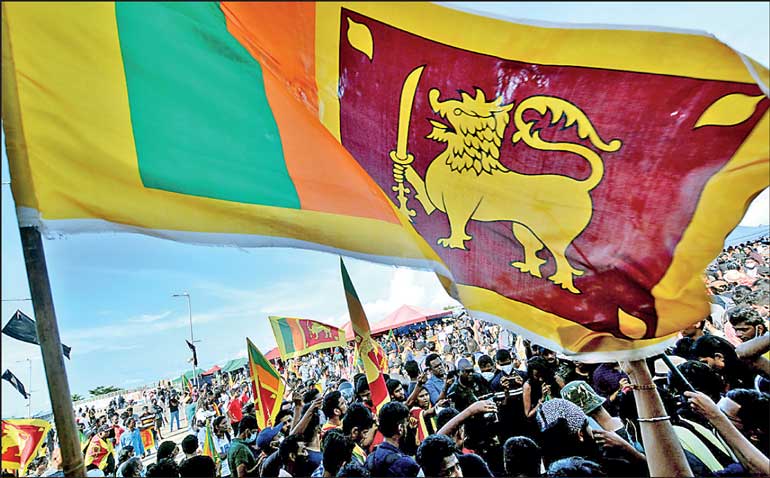Friday Feb 20, 2026
Friday Feb 20, 2026
Friday, 16 September 2022 00:00 - - {{hitsCtrl.values.hits}}

It may be inevitable that the country will be plunged into a severe catastrophe unless the official opposition and the protesters realise that, at this moment Sri Lanka is in a situation where the country should be directed to a reform program aimed at making a desirable and profound change in the system which is evil and corrupt rather than attempting to topple the Government
 After Ranil Wickremesinghe became the President, the dominance the Aragalaya had gained over the Government was suppressed by the police and the security forces without causing loss of lives or major injuries to the protestors. If it was not done, the authority of the Government would have collapsed completely, and the country would have plunged into a terrible state of anarchy; and the balance of payments crisis also would have plummeted into an uncontrollable point.
After Ranil Wickremesinghe became the President, the dominance the Aragalaya had gained over the Government was suppressed by the police and the security forces without causing loss of lives or major injuries to the protestors. If it was not done, the authority of the Government would have collapsed completely, and the country would have plunged into a terrible state of anarchy; and the balance of payments crisis also would have plummeted into an uncontrollable point.
By that time, the official opposition of the country too, had become an active participant of the Aragalaya. So much so, breaking the dominance of the Aragalaya came under strong opposition not only of the protestors themselves, but also of the movement of the official opposition as well. By the time the new president ended the dominance gained by the Aragalaya, the belief of the protestors as well as the official opposition was that by taking the struggle one step further would enable them to topple the Government and capture the ruling power of the country.
Although there is no room for such a change of power within the existing political system, not only the young protesters but also the educated elderly professionals and even the experienced leaders of trade unions who supported the Aragalaya, quite uncritically, were unable to realise the simple fact that under the present constitution of Sri Lanka it would not be possible to change the Government during the period within two elections.
Utopian vision
President J.R. Jayewardene, in formulating the second republican constitution of Sri Lanka, had taken into account the American presidential system and the French presidential system of governance and drafted it in such a way that no government in power could be changed during its official term except in an election held at the end of its official term. Under the previous parliamentary system of governance, there was a possibility of forcing the Prime Minister to dissolve the Parliament through a powerful public agitation and pressure exerted on him or her. But there was no room at all for such a change in the presidential system introduced by President Jayewardene. Even in an instance in which the president renounces his office voluntarily before the end of the term of presidency, it is through an election held in the parliament and not through a presidential election that a new president will be elected for the remainder of the term of the outgoing president.
Under the circumstances, impeachment is the only way to remove a president from his or her office. The fact that President Gotabaya Rajapaksa fled the country and resigned from his office thereafter does not disprove this condition and it can be described as a special situation that arose due to his stupidity and lack of self-confidence to face the crisis. The main reason that caused the Aragalaya to end up in a point of deadlock or stagnation is due to its attempt to achieve an unattainable goal without understanding this special characteristic inherent in the constitution namely that there is no chance of overthrowing the government in power during its official term except in an election. It is without rectifying this serious error that the protesters are now dreaming of a renewed struggle.
In a system of governance where there is no provision for changing the government in power in the interim of two elections, a strong effort to bring the people to the streets and launch a struggle could only end up in a great disaster if not in a revolution. Not only the protestors but also the opposition parties that are dreaming of capturing power taking advantage of the struggle launched by the former are inexorably pushing the country to such an end. But, this does not imply and must not be misconstrued that the Government is better than the movement of the official opposition parties.
About the repression
Ranil Wickremesinghe after assuming the presidency deprived the Aragalaya of the domination it had gained by employing the police and mobilising the security forces. It can be said that it was very necessary to do so in order to overcome the anarchic situation in the country. In doing so, the protestors did not die and no major injuries or casualties were reported. Despite repeated claims made by spokesmen who raise their voice on behalf of the Aragalaya, that the Prevention of Terrorism Act (PTA) is being used to suppress the protestors, fact remains that only three student leaders of the Inter University Students Federation (IUSF) have been arrested and detained under the PTA law.
It would have been better if the prevention of terrorism act was not applied for those three detainees as well. However, the accusation made against these three persons that they have involved themselves actively in a program to seize power by force through the Aragalaya cannot be completely ignored. Anyone can appear ideologically for a vision that advocates the seizure of power arbitrarily. It is not illegal. But apart from that, if someone is engaged as an active partner in a program which has been implemented to seize power by force, then it would be possible for the law to be imposed against him by treating him as a terrorist engaged in that act.
Morality of the Aragalaya
The arrests of those involved in protests and subjecting them to questioning, prosecution and punishment are considered as normal occurrences in struggles. Mahatma Gandhi, who can be considered the greatest freedom fighter ever produced in the world, has described the imprisonment of freedom fighter as follows: “We should enter prison cells like a bridegroom entering a bride’s chamber. We should cherish freedom being within the walls of prison cells.”
Gandhi was also unique in the way he faced the court cases filed against him. On March 10, 1922, the British police arrested Mahatma Gandhi on the charge that he has provoked and instigated people to rise against the government by publishing three ‘politically sensitive articles, authored by him, in his weekly newspaper called ‘Young India’. When the case was taken for hearing, Gandhi, appearing for himself and addressing the judge admitted that he through those articles has requested the readers to show dis-affection to the existing system of government, and stated that he did it knowing that to do so was illegal, and that he should be given a punishment commensurate with the gravity of his crime.
In his remarkable statement to the judge, he said, “…I am, therefore, here to submit myself not to a light penalty but to the highest penalty. The only course open to you, Mr. Judge, is … either to resign your post or inflict on me the severest penalty.” The judge sentenced Gandhi to six years imprisonment; and he commented that “the law is no respecter of persons. Nevertheless, it will be impossible to ignore the fact that you are in a different category from any person I have ever tried or am likely ever to try … in the eyes of millions of your countrymen you are a great patriot and a great leader; even all those who differ from you in politics look up to you as a man of high ideals and of noble and even saintly life.”
And the judge further stated that he would be happy if the government extenuates the sentence that he imposed against Gandhi. Then addressing the court Gandhi said that the sentence passed on him by the judge was the lightest sentence that could be imposed by a judge based on the charges levelled against him. In prison, Gandhi authored the first part of his autobiography ‘My Experiments with the Truth’. This incident undoubtedly helps to understand the degree of loyalty and integrity that the leaders who appear for far-reaching wholesome changes and transformations should possess.
What could happen?
Although Sri Lanka is now in a relatively better position than it was prior to the appointment of Ranil Wickremesinghe as the president, it has not yet crossed the danger zone, fully. Sri Lanka having a president of the calibre of Ranil instead of Gotabaya can be considered an accidental outcome of the Aragalaya, which is beneficial for the country. But he has to perform as a president who does not have a group of parliamentarians of his own; consequently he is compelled to be dependent upon the parliamentary group of the Pohottuwa Party which has come under severe protest by the public. In that sense, the Government including the President does not have a dignified image except an ugly look.
Nevertheless, at this particular moment, Ranil is important for the country, not as a long-term administrator, but as a leader, to plan and implement a suitable reform program to overcome the crisis the country is facing, including the balance of payments crisis on a short-term basis. In order to overcome the crisis facing the country, a comprehensive reform program that includes socio-political and economic aspects is essential, and for that, a common agreement of all political parties is an indispensable condition. Initially, the opposition parties indicated that they would support such a program and not block it. However, now it seems that the official opposition party is drifting away from that stance and persuading the activists of the Aragalaya to attack the IMF program.
Some of the reforms that need to be implemented to overcome the balance of payments crisis are austere and could be explosive. If one wants to, they could be turned into a fiery source of public agitation. It may be inevitable that the country will be plunged into a severe catastrophe unless the official opposition and the protesters realise that, at this moment Sri Lanka is in a situation where the country should be directed to a reform program aimed at making a desirable and profound change in the system which is evil and corrupt rather than attempting to topple the Government.